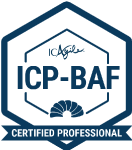Overview
Certified Professional in Business Agility Foundations (ICP-BAF) certification upon successful completion of the course.
Business Agility Foundation explores the mindset, approaches, and skills demanded in today's dynamic and fast-moving world – a world where change is constant, disruption expected, and teamwork is a competitive advantage. Every level and every role in today's organization must focus on customer delight and bringing innovation and continuous improvement into our work. The tools that served us well in the past do not necessarily still apply.
Today’s business requires a paradigm shift from the traditional approaches to our business challenges. To be effective, the Business Agilist must adopt a new mindset and a new set of skills, often guiding teams through methods to maximize business value. To do so requires a new mindset – the Agile mindset. The course gives you the much-needed skills for value-based approaches to help you on your path to business agility.
Acting in an Agile fashion challenges many of our learned organizational behaviors. Our individual behaviors must change so that our organizational behaviors can change. To become agile we must adopt new skills, abilities, and new ways of thinking. As a change agent for shifting the way the organization works, we first have to recognize our own blind spots and preconceptions.
The Business Agility course goes beyond the realms of Agile software development. Although many of the Agile techniques are transferrable, the course aims at improving business agility rather than software development.
This Business Agility Foundations course follows a highly experiential set of learning objectives to equip participants with new knowledge, tools, and techniques they can implement immediately. Aligned with ICAgile’s Business Agility Foundation certification, the course jumpstarts the organizational and individual transformation towards a more responsive, value-driven reality. The Business Agility Foundation course is the first step towards achieving the coveted expert level in ICAgile’s Business Agility track.

- Successfully complete an ICAgile accredited course taught by an ICAgile Authorized Instructor.
- ICAgile Authorized Instructors can withhold certifications based on lack of participation or understanding of course learning outcomes.
GSA: $1485 USD
Next Upcoming Course


Train up your teams with private group training
Have a group of 5 or more students? Cprime also provides specialist private training with exclusive discounts for tailored, high-impact learning.
Business Agility Foundation (ICP-BAF) Schedule
Full Course Details
Part 1: Welcome and Introductions
- Summary: Opening and general logistics for the class.
- We start with the basics to get to know each other and understand the objectives of the course. We will model the creation of Working Agreements that contribute to building trust on a team.
- Topics covered:
- Opening and Introductions
- Agenda and Learning Objectives
- ICAgile Certification Overview
- Working Agreements
Part 2: The Need for Business Agility
- Summary: Today’s environment is one of perpetual change at a rapid pace. A VUCA world best describes our current times – one of volatility, uncertainty, complexity, and ambiguity. Our traditional tried and proven methods do not let us respond to these conditions at the required pace. To meet these demands, successful companies adopt the practices of Business Agility. To achieve agility organizations have to change the way they think about the workforce, customer value, and product development. We will also cover the following: What is Business Agility? In this section, we will look at what it means for an organization to be “Agile.” Topics include the foundational components of Business Agility such as principles, teamwork, customer value, and continuous improvement.
- Topics covered:
- Business Agility: Drivers, Criticality, Values, Principles, and Dimensions
- VUCA
- Case for Change: Empowering Teams
- Case for Change: Customer Value and Continuous Learning
- Measures of Success
Part 3: Compelling Vision and Clarity of Purpose
- Summary: Painting a vision of the future with a strong sense of purpose is an essential component to enabling high-performance. It brings alignment to teams and stakeholders. Operating in an Agile fashion challenges our learned organizational behaviors and outdated thoughts about management. In this section, we will look at how building a vision of the future guides our teams and ways that our individual behaviors must change so that our organizational behaviors can change. Gaining new skills and abilities is essential but we also have new ways of thinking about work and the customer experience. As a change agent for shifting how the organization works, we first have to recognize our own blind spots and pre-conceptions.
- Topics covered:
- Compelling Vision and Clarity of Purpose
- Focusing on the Big Picture and Emerging Future
- Blindspots, Mental Models, Patterns, and Sensemaking
- Complex Dynamics of Change
- Understanding of Customers, Stakeholders, and Emerging Markets
- Topics covered:
Part 4: New Ways of Thinking
- Summary: Creating and managing value is the essence of Business Agility. To do so requires an understanding of value. This includes defining value, making value visible, managing the cost of value, and the time to achieve value. In this section, we will look at new ways of thinking to help us manage and produce value. This includes adopting a growth mindset, recognizing marginal value and negative value, and using Polarity Management to manage problems. We will look at different ways of thinking such as the Lean systems perspective for linking goals and actions and Design Thinking to help us accelerate effectiveness and agility.
- Topics Covered:
- Developing a Growth Mindset
- Breaking Paradigms and Making Value Visible
- Relationship Between Complexity and Business Agility
- Recognizing and Managing Dilemmas, Paradoxes, and Polarities
- Lean Systems Thinking
- Design Thinking Approaches
- Topics Covered:
Part 5: New and Differentiating Behaviors
- Summary: To drive new approaches to working requires that we leverage new behaviors. In this section, we look at ways of working that will help enable business agility. We will start with one of our most effective tools, high performance questions, to motivate fresh thinking and challenge assumptions. Business Agilists demonstrate a bias for action and look to empirical measures for our results so we can make proper decisions, such as to pivot or persevere. This section includes a sampling of the Lean Startup framework, Kanban systems, and iterative frameworks.
- Topics covered:
- High-Performance Questions: Ask vs. Tell
- Experimenting and Hypothesis Testing
- Lean Startup and Canvases
- Kanban Values and Systems
- Iterative Framework and Sampling of Practices
- Topics covered:
Part 6: Designing the Future
- Summary: Enabling agility in an organization requires changes how each person works and an environment that nurtures agility. An environment that focuses on what is important, practices continuous improvement, and embraces emergent learning. As individuals, we have to break free from our traditional ways of thinking and move towards an Agile mindset. In this section, we reflect on Business Agility capabilities and practices, synthesize workshop learnings into actionable workbooks, action plans, and personal development plans.
- Topics Covered:
- Creating Space for Optimal Engagement and Value Creation
- Business Playbook
- Action Plans for Accelerating Business Agility
- Personal Development Plan
- Review ICAgile Learning Objectives and Video
- Topics Covered:
Anyone interested in the paradigm shifts necessary to enable organizational agility in today's innovative business climate will find the Business Agility Foundations course compelling. This includes leaders and aspiring leaders in organizations seeking more responsive, value-driven approaches will benefit from this course. The professional-level certifications targets organizational disciplines, including and beyond, technology and software development. This includes:
- Current and aspiring Business Agility Leaders
- Business Change Agents
- Business Leaders
- Business Managers
- Value Managers
- Product Owners
- Product Managers
- Anyone wanting certification in ICAgile Business Agility Foundation (ICP-BAF)
- Anyone wanting to become an ICAgile Certified Expert in Business Agility
- The Need for Business Agility
- How to Identify Value
- Techniques to Better Understand Customers
- Understand the Dynamics of Change, Systemic Problems, and Disruptive Threats
- Polarity Management
- Apply New Ways of Thinking such as Lean Systems Think and Design Thinking
- Dynamics Behind Growth Mindset, Breaking Paradigms
- Understand New Behaviors to Exhibit
- Understand Lean Startup Techniques and Philosophy
- Understand How to Leverage Kanban Values and Systems
Although there is not an ICAgile official exam, ICAgile allows for their course accreditors to determine appropriate means for retention of the learning outcomes. Depending on your provider, there may be some type of assessment in order to earn certification.
Many providers assess via participation, activity and understanding conveyed via exercises and discussion, withholding certification when appropriate.
